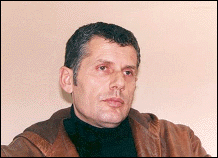 THE CONSTRUCTION SECTOR, BUILDING THE FUTURE THE CONSTRUCTION SECTOR, BUILDING THE FUTURE |
Just three years have passed since the war in Kosovo ended and hardly any trace of it can be noticed now. Most of the 250,000 burned or destroyed houses have been reconstructed, a great deal of the financing has come from international donations, but Kosovar citizens themselves have largely done the actual work. According to Mr. Hugues Mingarelli the head of EAR (European Agency for Reconstruction) ,one of the main donors for housing reconstruction, "about 100 million Euros have been allocated by the European Union for the reconstruction of over 15000 houses." The horrific damage suffered by Kosovo“s housing during the war, has been the main reason why the construction sector developed so swiftly as compared to others. The construction sector has been a preferred target sector for private investment activity within Kosovo, mainly because of the great demand of the innumerable donations and tenders for small infrastructure projects offered by international aid agencies, NGO“s. Again the lack of financing has also been a major obstacle to private finance housing projects. To further cripple the sector there are no mortgage loans granted by ANY bank or institution. Thankfully there is the EAR, UNMIK and hundreds of other donors that have sustained the growth of the sector.

Mr. Hugues Mingarelli
In the past two years that the reconstruction has been taking place, building of new houses and anarchic city planning has developed new problems for UNMIK officials at its Pillar II. The lack of construction licensing was the primary obstacle in the construction of new buildings and large structures. The lack of proper municipal initiative in devising plans for large construction projects by municipalities lead to a situation in which Kosovars were allowed to build without regards to any city planning project. The result has been choked with city structures by individual construction and independent housing projects. Prishtina real estate prices have risen from 400 to 1000 Euros per square meter in the last two years. Construction companies in Kosovo are at a consolidation phase, most are trying to find ways to break through regulations and obstacles pocess; with the new institution building process the new laws being implemented are aimed at controlling anarchic activities within the sector.
Information released from the Kosovo Chamber of Commerce concludes that the combined production of the 7 main producers devoted to manufacturing various construction materials were only able to produce up to 166 million bricks and 15 million roof tiles a year whilst working at full capacity. Only a small number of factories are currently functioning and these are mainly located in the towns of Gjakova, Podujeva and Peja which makes outsourcing from neighboring countries more feasible and affordable for many retailers and wholesalers; the inevitable end result is the loss of market for Kosovar manufacturers. To this day the production capabilities of these enterprises remains very limited and they are hardly able to fulfill a fraction of the demand of Kosovo“s rapid transformation and reconstruction process, let alone be competitive enough to achieve economies of scale and conquer regional markets. The idea of becoming international players is more a dream than a reality. At the beginning of the reconstruction phase the demand for construction materials in Kosovo was at its peak. Nevertheless, most of the local construction material the manufacturing industry could not profit or even reactivate itself, due to the lack of structural support and proper planning. Kosovo“s demand for construction materials during the emergency phase for reconstruction was wholly satisfied with imported products, which were mainly bought from Greece, Macedonia and also Serbia. The manufacturing capacity of Kosovo“s construction materials industry didn't, and continues to not even closely cover the needs of the region. Kosovo“s construction materials' imports have mainly been: ceramic tiles, sanitary tiles, and almost all the essentials used in residential construction building; materials ranging from insulation fibers, wood, cement, limestone, but also iron/steel which are abundant in Kosovo, but only as raw materials. For even the smelting and metallurgy had been brought down to a stand still. As Mr. Ismajl Kastrati, President of Kosova Chamber of Commerce argues, that Kosovo“s "strategic goal" should be the "substitution of import consumer products and stimulation of regional exports and wider ".

Realizing the needs for materials and the lack of locally produced supply, The European Agency for Reconstruction sought to reactivate one of the main construction material producers. With generous assistance from the EAR the brick Manufacturing Company IMN situated in Gjakova which specialized in the manufacturing of bricks and other basic construction materials, was able to develop a new production line for roof tile manufacturing that was inaugurated at the beginning of the year 2002. IMN is one of the most important roof-tile factories in the region.
| The European Agency for Reconstruction also granted IMN another 600,000 Euros to reactivate its production of Mediterranean Style tiles for the Kosovo market. This is the first loan that was granted for the regeneration of manufacturing for the construction materials sector, nevertheless housing development needs are being completely met by export products and not local production.
Construction is an attractive but very challenging field for new investments in Kosovo. According to the Kosovo Chamber of Commerce, of the over 2774 registered enterprises in the end of 2001, 1667 were construction enterprises, which clearly defines the saturation level of the sector. Besides construction of medium to low structures, the types of building enterprise that prevails are small construction projects that employ 1 to 4 people on a temporary basis. These are short life companies specialized in the building of private houses and they mushroom and disappear with the same speed. Building of bigger and more complex structures and the rehabilitation of roads, highways and sport centers is not really being granted to Kosovar enterprises, but rather foreign companies quick to take on the nicely paid tenders offered by the EAR, UMIK and KFOR bodies.

The GM and owner of Nartel, Mr. Gani Mehmati
The GM and owner of Nartel, Mr. Gani Mehmati a medium size private construction company, complains that "there are lots of people that offer their services and most of them do not offer professionalism or quality but they offer low prices and of course they win most tenders of UNMIK and the EAR". The biggest portion of private capital invested in the sector has been absorbed in the quarry sector, by companies such as Betja Commerce, who are mainly dedicated to stone breaking, the production of concrete and concrete materials, as well as in separation of sand.
In the immediate aftermath of the NATO campaign thousands of micro construction companies specialized in small-scale construction projects, flooded the sector. Two years later, the first signs of consolidation within the sector are becoming apparent. Most companies are seeking to specialize in retailing or exclusive distribution rights of unique brand names such as the case for Xheni commerce. There are many companies involved in import and distribution of construction materials. One of the most reputable companies engaged in retail, and planning to enter manufacturing is Xheni commerce.
Xheni Commerce prides itself in 10 years experience in roofing and retail of many other quality construction materials. From their modest beginnings in the early 1990“s the company has emerged as one of the private enterprises with the most transparent activities, best products and most reasonable pricing schemes.
Not that Kosovo lacks good construction or engineering
companies, there is no lack of good engineering
and construction companies in Kosovo. The reputable
Civil engineering company "Mabetex"
directed by Mr.
Behxhet Pacolli is a company that UNMIK has
not granted as many tenders as it should have since
its services are reliable and competitively priced.
Mabetex actuality enjoys an impeccable reputation
and has successfully executed projects of extreme
complexity with tremendous success all over the
world. Although it offers cheaper prices for its
services than other international companies, it
has never been granted a serious construction tender.
Mabetex however is extremely involved in the reconstruction
of Kosovo and its development. Mabetex engineers
and architects are in the development phase for
the construction of a major housing project that
will host a large office and business center, as
well as indoor parking, restaurants and even a shopping
center. An additional six commercial buildings will
rise on an esplanade in the outskirts of Prishtina.
Aside from Mabetex, Kosovo used to have other construction engineering giants, which left their mark in many places around the world, "Ramiz Sadiku" use to employ 10,000 workers and had a great reputation for carrying out important construction projects in Lebanon, Tunisia, and other different parts of Africa and the middle east. By the end of the 1990“s this company could hardly secure basic salaries, just 100 Euros to its 90 regular employees. Most of these companies have now disappeared; there are some that remain but things are not what they use to be. Currently, the main construction companies in Kosovo are Ndėrrmarrja Komunale Banesore BVI (Kosovo“s building regulation authority), which define the locations for construction. While work is also done by some private companies such as, "Standard" and the socially owned "Morava e Binqės". The works by these companies have not yet been very significant since the end of the war.
The urgent need for infrastructure development and commercial housing leaves the doors wide open to serious investments in the sector. With most of the reconstruction completed the opportunities for investment will be more in line for large infrastructure development projects and civil engineering projects. The end of reconstruction is just the beginning of a new phase of construction development, where only those able to offer competitive and sophisticated services will really have space within the sector. |

